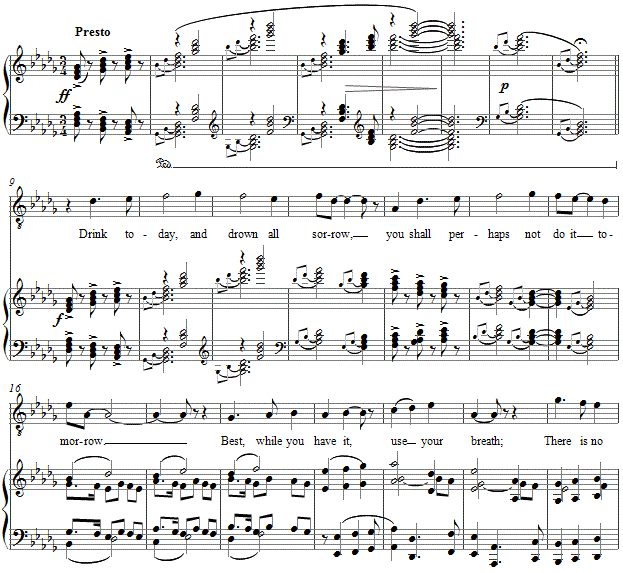Music and Texts of GARY BACHLUND
Vocal Music | Piano | Organ | Chamber Music | Orchestral | Articles and Commentary | Poems and Stories | Miscellany | FAQs
The drinking song - (2013)
John Fletcher
for tenor and piano
Drink to-day, and drown all sorrow,
You shall perhaps not do it to-morrow.
Best, while you have it, use your breath;
There is no drinking after death.
Wine works the heart up, wakes the wit;
There is no cure 'gainst age but it.
It helps the headache, cough, and tisic, [ 1 ]
And is for all diseases physic.
Then let us swill, boys, for our health;
Who drinks well, loves the commonwealth.
And he that will to bed go sober,
Falls with the leaf still in October.4 pages, circa 2' 30"
John Fletcher
The text is said to come from the posthumous publication, Bloody Brother, 1639. John Fletcher (1579–1625) was a playwright in the era of Shakespeare and Jonson, both of whom scholarship shows to have been collaborators in plays with Fletcher. He followed Shakespeare as house playwright for the King's Men, being a prolific and influential dramatist. His fame has been said to have rivaled Shakespeare's in that era. One Fletcher play, The Tamer Tamed (published in 1624), which answers Shakespeare's The Taming of the Shrew (circa 1590-92). His repute began to re-emerge in the time of Tennyson.
The text being so enthusiastic, it called for a setting quite in the same vein. The large gesture sweeps aggressively from tonic to subdominant and lingers. The vocal rises upward in arches, and each of the three verses in the poem are treated differently, with a reprise of the first at the end. Thus is it an ABCA form. The last verse of the poem slows the tempo of the setting and quiets it, while the imagery of sobriety includes its antithesis in the accompaniment as non-harmonic chromaticism slips in between chord changes. The reprise then is rollicking, and ends fortissimo.
The score for The drinking song is available as a free PDF download, though any major commercial performance or recording of the work is prohibited without prior arrangement with the composer. Click on the graphic below for this piano-vocal score.
NOTES
[ 1 ] An archaic spelling of a still-contemporary range of diseases, or consumption; phthisis, i.e., any disease that causes wasting of the body, esp. pulmonary tuberculosis. The root comes through Latin from Greek, for wasting away.

